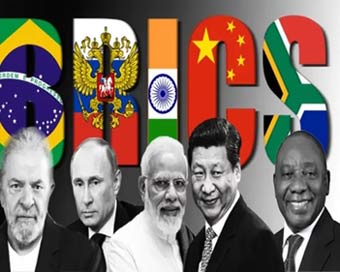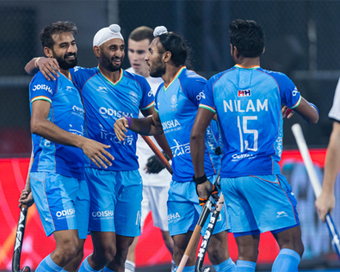 PM Modi visit USA
PM Modi visit USA Only the mirror in my washroom and phone gallery see the crazy me : Sara Khan
Only the mirror in my washroom and phone gallery see the crazy me : Sara Khan Karnataka rain fury: Photos of flooded streets, uprooted trees
Karnataka rain fury: Photos of flooded streets, uprooted trees Cannes 2022: Deepika Padukone stuns at the French Riviera in Sabyasachi outfit
Cannes 2022: Deepika Padukone stuns at the French Riviera in Sabyasachi outfit Ranbir Kapoor And Alia Bhatt's Wedding Pics - Sealed With A Kiss
Ranbir Kapoor And Alia Bhatt's Wedding Pics - Sealed With A Kiss Oscars 2022: Every Academy Award Winner
Oscars 2022: Every Academy Award Winner Shane Warne (1969-2022): Australian cricket legend's life in pictures
Shane Warne (1969-2022): Australian cricket legend's life in pictures Photos: What Russia's invasion of Ukraine looks like on the ground
Photos: What Russia's invasion of Ukraine looks like on the ground Lata Mangeshkar (1929-2022): A pictorial tribute to the 'Nightingale of India'
Lata Mangeshkar (1929-2022): A pictorial tribute to the 'Nightingale of India' PM Modi unveils 216-feet tall Statue of Equality in Hyderabad (PHOTOS)
PM Modi unveils 216-feet tall Statue of Equality in Hyderabad (PHOTOS)Hockey India has announced a 54-member core probable squad for the upcoming senior men’s
- Satwik-Chirag return as BAI names 14-strong squad for BWF Sudirman Cup Finals 2025
- Men’s Sr Hockey Nationals to be played in division-based format from April 4
- Mensik denies Djokovic 100th title in Miami final
- KIPG: Son of a vegetable vendor, Bihar’s Jhandu Kumar eyes Worlds, 2028 Paralympics
- Hardik Singh credits hard work and team unity for receiving HI Midfielder of the Year award
BRICS summit: Navigating uncertainties through Indian and global south partnership Last Updated : 22 Aug 2023 01:34:19 PM IST 
The BRICS group will conduct its 15th summit from August 22 to 24 at the Sandton Convention Centre (SCC) in Johannesburg, South Africa, during which it is likely to discuss a proposal for a new currency backed by gold, aimed at decreasing dependence on the US dollar, though its motivations are debated.
Earlier in the day, Prime Minister Narendra Modi left for South Africa to participate in the summit.
South African President Cyril Ramaphosa, Chinese President Xi Jinping, Brazil's President Luiz InacioLula da Silva are expected to be present in the summit, which will be the first in-person BRICS summit since the Cvoid pandemic broke out.
The move away from using the US dollar in international transactions is gaining momentum, and Russia, China, and Brazil are increasingly using other currencies for cross-border deals.
The BRICS countries, Brazil, Russia, India, China, and South Africa, are also thinking about creating a shared cryptocurrency and coordinating their digital currencies from central banks which would help their currencies work together smoothly and boost economic unity.
Some believe it is to solidify BRICS's global economic leadership, while others see it as a response to internal economic issues. The timing of the announcement likely stems from perceived economic and diplomatic vulnerabilities of the US.
The summit will focus on trade, investment, sustainable development, innovation, and global governance reform.
Making a new BRICS currency would need a lot of talks and creating systems for exchange rates, payments, and financial market rules. But the grouping may like to concentrate on designing an efficient integrated payment system for cross-border deals before exploring prospects of a new currency.
The leaders will also talk about making their economies work better together. There may be conversations about trading, investing, and working together in areas like energy, infrastructure, the digital economy, and employment generation. On the final day of the summit, there will be discussions with leaders from various countries. Around 67 leaders from Africa, Latin America, Asia, and the Caribbean were invited to the summit, according to South African Foreign Minister Naledi Pandor.
She also mentioned that they would focus on the relationship between BRICS and African countries, in keeping with the summit’s theme "BRICS and Africa”, adding that BRICS partners are excited to explore opportunities to leverage the African Continental Free Trade Region.
The term BRIC was coined by Jim O'Neil, a Goldman Sachs economist, in 2001 to talk about the growth of Brazil, Russia, India, and China. These countries had their initial meeting in 2009 in Russia. When South Africa joined the next year, the group started being called BRICS.
BRICS countries currently make up over 40 per cent of the world's people and about 26 per cent of the global economy. Every year, they meet for a BRICS Leaders' Summit, to discuss political and socioeconomic coordination, focusing on business opportunities, economic complementarities, and areas of cooperation that they've identified.
The BRICS group aims to work together to reshape global politics and economics in their favour. They use forums like the BRICS Parliamentarian Forum and Outreach Dialogue to discuss and engage with neighbouring regions and other interested countries.
For example, South Africa uses the BRICS platform to focus on its foreign policy priorities, like the African Agenda and South-South Cooperation. Economic relationships among members are strengthened through the BRICS Business Council, the Contingent Reserve Agreement, and the New Development Bank (NDB). The NDB, based in Shanghai, helps fund infrastructure and sustainable projects in BRICS countries. The Contingent Reserve Agreement offers short-term financial support to members for boosting financial stability and reducing payment crises.
During the 21st century, the BRICS alliance has emerged as a strong group of developing economies. Recently, the BRICS surpassed the G7 in terms of their contribution to the world's GDP. Together, they make up almost one-third of the global economic activity.
With economic troubles in the West, the BRICS even considered creating their own global currency to reduce the dominance of the US Dollar, which has prevailed since the breakdown of the Bretton Woods system in 1971.
The BRICS Summits are usually quiet affairs, but in South Africa, the lead-up to the 2023 summit has been filled with a string of international relations dramas. The upcoming main event, being currently hosted by South Africa, might be a notable move in reshaping global power dynamics. All African heads of state are invited, and around 40 countries worldwide are eager to join the geo-economic group, from Argentina to Kazakhstan. It marks a significant milestone in political solidarity among countries of the Global South.
As the current Chair of BRICS, South Africa will focus on the theme of 'BRICS and Africa: Partnering for Growth, Sustainability, and Inclusive Multilateralism. This theme guides South Africa's five priorities for 2023: creating a fair and smooth transition, addressing climate change risks, enhancing capacities education and skills for the future, utilizing opportunities from the African Continental Free Trade Area and advancing post-pandemic recovery and sustainable development, and promoting women's involvement in peace processes.
Modalities of expansion will be one of these themes. More than 40 countries like Saudi Arabia, Iran, United Arab Emirates, Argentina, Indonesia, Egypt, and Ethiopia want to join BRICS. Leaders have not yet reached any consensus about how exactly to admit new members.
Rajiv Bhatia, a Distinguished Fellow at the Gateway House think tank, Mumbai and a former Indian diplomat, explained that the push towards BRICS originates from two main reasons. Firstly, there's a notable global aversion to the US, prompting these nations to seek a platform to unite around this sentiment. Secondly, there's a strong desire for multiple power centres, a space where Global South countries can stand together.
Members are likely to discuss also about ways to increase fundraising and lending in local currency at the New Development Bank (NDB), often referred to as the BRICS bank.
Using local currency will reduce the risk of being affected by changes in foreign exchange rates. The NDB is expanding, and the summit might attract more countries. Bangladesh, UAE, and Egypt joined since 2021. Uruguay is in the process of joining, and Algeria, Honduras, Zimbabwe, and Saudi Arabia are interested.
It's the largest gathering of this group so far, and over 60 countries are invited by the hosts. Prime Minister Modi will have several meetings on the sidelines of the summit, including with several African leaders.
Earlier, On July 24, National Security Advisor Ajit Doval met with Wang Yi, a key member of China's Communist Party (CPC) and Director of the CPC Foreign Affairs Commission, during the BRICS NSAs' meeting in Johannesburg.
Doval conveyed the message that tensions along the India-China border since 2020 have damaged the trust between the two nations and the foundation of their relationship, stressing the need to work together to resolve the situation and bring peace to the border areas in order to restore normalcy in their relations. Both sides acknowledged that the India-China relationship holds significance not only for their countries but also for the broader region and the world.
Still earlier, in early June, External Affairs Minister S. Jaishankar visited Cape Town, South Africa to attend a BRICS foreign affairs ministers'' meeting. The foreign ministers' gathering set the agenda for the summit in August. Two agenda items in particular had strong potential for bolstering the group's geopolitical unity: enlarging BRICS membership and establishing a shared common currency.
The outcome of the South Africa summit will be closely watched, as it will determine the alliance's future direction in dealing with global challenges.
How the BRICS countries handle the complexities of the Ukraine war, group expansion and maintain unity are key issues to be discussed and worked out.
Despite these challenges, the upcoming South Africa summit offers a vital opportunity to address these concerns, enhance cooperation, and chart the alliance's course ahead. The deliberations on a common currency reflect the desire to lessen reliance on the US dollar, showcasing the group's commitment to reshaping the global economic regime.
The BRICS coalition possesses the potential to profoundly influence a new global economic order through collective efforts, yet its realisation remains contingent on future developments. Only time will reveal the extent to which this vision materialises.
IANS New Delhi For Latest Updates Please-
Join us on
Follow us on








172.31.16.186







